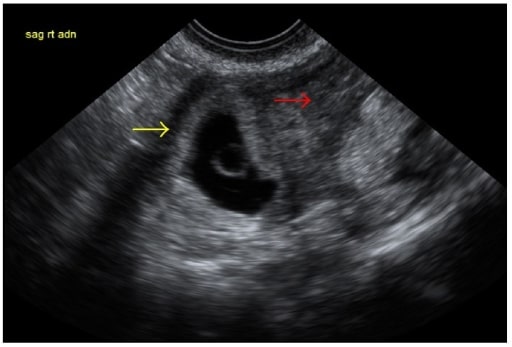Playlist
Show Playlist
Hide Playlist
Ectopic Pregnancy: Management
-
Emergency Medicine Bord Ectopic Pregnancy.pdf
-
Download Lecture Overview
00:01 So what are our steps here? So for an unstable patient take care of your ABCs, your airway, your breathing, your circulation. 00:08 Make sure the patient has good IV access. 00:11 Administer IV fluids. 00:13 If the patient has significant blood loss or is unstable go ahead and transfuse blood. 00:18 This is a situation where you may need to use uncross match blood, so O negative blood. 00:23 If the patient has RH negative blood type. 00:27 So if their blood type is A negative, O negative, B negative which ever. 00:31 You wanna administer RhoGam, and that’s gonna prevent from having complications either later in that pregnancy or with future pregnancies. 00:39 And then the options are surgery versus medical management. 00:44 So surgical management generally done by laparoscopy more commonly than laparotomy. 00:52 Laparoscopy is when you use cameras to take a look in the abdomen, done through smaller scars and smaller openings. 00:59 Laparotomy is when you make a large midline incision and go in and do the procedure. 01:06 Also to consider salpingostomy which is when the pregnancy is removed from the fallopian tube is preferred over salpingtectomy. 01:14 Salpingtectomy is when the fallopian tube itself is removed. 01:19 And it’s important to remember that transvaginal ultrasound will lead to earlier diagnosis and less operative interventions for these patients. 01:28 Now, medical management is another option. 01:32 And this is a great option for people who don’t want surgery or you know, who are otherwise stable. 01:39 Now, medical management takes place with methotrexate. 01:42 And what methotrexate does is it creates a medical abortion for the patient. 01:46 It has a very good success rate. 01:50 Uppers of 80%, so 85-93% success rate. 01:54 So what that means is that, a good majority of patients who have an ectopic pregnancy who are treated this way, will do okay. 02:01 They will abort the pregnancy and the pregnancy won’t rupture. 02:05 Now if you’re doing this, you need to make sure you follow your hCG levels to zero. 02:09 So you need to make sure that that level is decreasing and that the patient understand what to return to the Emergency Department for. 02:16 Because between 7 and 15% of these patients this treatment won’t work. 02:21 And what happens when it doesn’t work? When it doesn’t work, that pregnancy continues to grow. 02:27 And when the pregnancy continuous to grow the patient may develop a ruptured ectopic pregnancy. 02:32 So definitely you have to make sure that you selected the right patient for this treatment. 02:38 When should we use it? We can use it for clinically stable patient. 02:43 For patients who are hemodynamically okay. 02:47 They have a normal blood pressure. 02:48 They have a normal heart rate. 02:50 For a mass or pregnancy sac of less than 3.5 cm. 02:56 There shouldn’t be any fetal cardiac activity. 03:00 So if you see any kind of fetal cardiac activity, methotrexate is not your drug of choice. 03:05 And also if there’s no evidence of rupture. 03:08 So you need to make sure you check up all these boxes. 03:10 I include one other thing here that I need to make sure that my patient is reliable and that they understand what to come back to the Emergency Department for. 03:18 This isn’t necessarily a great option for someone who’s unreliable. 03:22 For patient who you think will not return to the Emergency Department, if they get a certain symptoms. 03:27 For someone who you know will ignore their symptoms for a period of time. 03:32 You wanna make sure that you self-select, or that you select the right people to get this medication. 03:38 For those patients that have that indeterminant ultrasound. 03:42 So the ultrasound doesn’t tell you that there is an ectopic pregnancy but it also doesn’t tell you that there’s something in the uterus. 03:48 For those patients you can check serial hCG levels. 03:53 Now, those levels in a normal pregnancy should double every 1 and a half to 3 days approximately. 04:01 So what you would wanna see is you wanna see if those numbers are doubling appropriately, if they’re staying the same or if they’re going down. 04:09 You also wanna advise your patient to get a repeat ultrasound. 04:13 For the most part that repeat ultrasound is recommended when the patient is in the good zone of the hCG level where you would expect to see something. 04:22 So for example if you obtain the first ultrasound when the HCG level is 500, you would wanna repeat that ultrasound when the HCG level is over about 2000. 04:32 Because that’s when you reliably expect to see something on the ultrasound. 04:37 You also wanna give your patient strict return precautions. 04:41 If they go home, if their pain changes in anyway, their bleeding changes. 04:45 The pain becomes more severe. 04:47 They feel light headed. 04:48 Tell them to come right back to the Emergency Department. 04:52 Because that may indicate that there is an ectopic pregnancy that just wasn't recognized initially. 04:57 So the conclusions here, ectopic pregnancy has the high maternal mortality. 05:02 Make sure that you’re thinking about it. 05:05 History and physical exam and lab findings can have poor sensitivity. 05:10 Serum hCG levels can help guide your treatment and your disposition. 05:15 But levels of less than 1000 can become an ectopic pregnancy. 05:19 Ultrasounds that are indeterminant will require follow-up for patients. 05:24 And management can either be surgical or medical depending on the size of the ectopic and whether or not there has been rupture.
About the Lecture
The lecture Ectopic Pregnancy: Management by Sharon Bord, MD is from the course Abdominal and Genitourinary Emergencies.
Included Quiz Questions
In the surgical management of ectopic pregnancy, salpingostomy is preferred over salpingectomy. What is salpingostomy?
- Removal of the ectopic pregnancy from the fallopian tube
- Use of large midline incision
- Insertion of a camera into the fallopian tube
- Removal of the fallopian tube
- Reattachment of the fallopian tube
What is the medication used in the medical management of ectopic pregnancy?
- Methotrexate
- Rhogam
- Misoprostol
- Mifepristone
- Tdap
What is the maximal size of an ectopic pregnancy that can still be considered to be amenable for medical management?
- 3.5 cm
- 3.5 inches
- 5 cm
- 5 inches
- 4 cm
Customer reviews
5,0 of 5 stars
| 5 Stars |
|
5 |
| 4 Stars |
|
0 |
| 3 Stars |
|
0 |
| 2 Stars |
|
0 |
| 1 Star |
|
0 |




